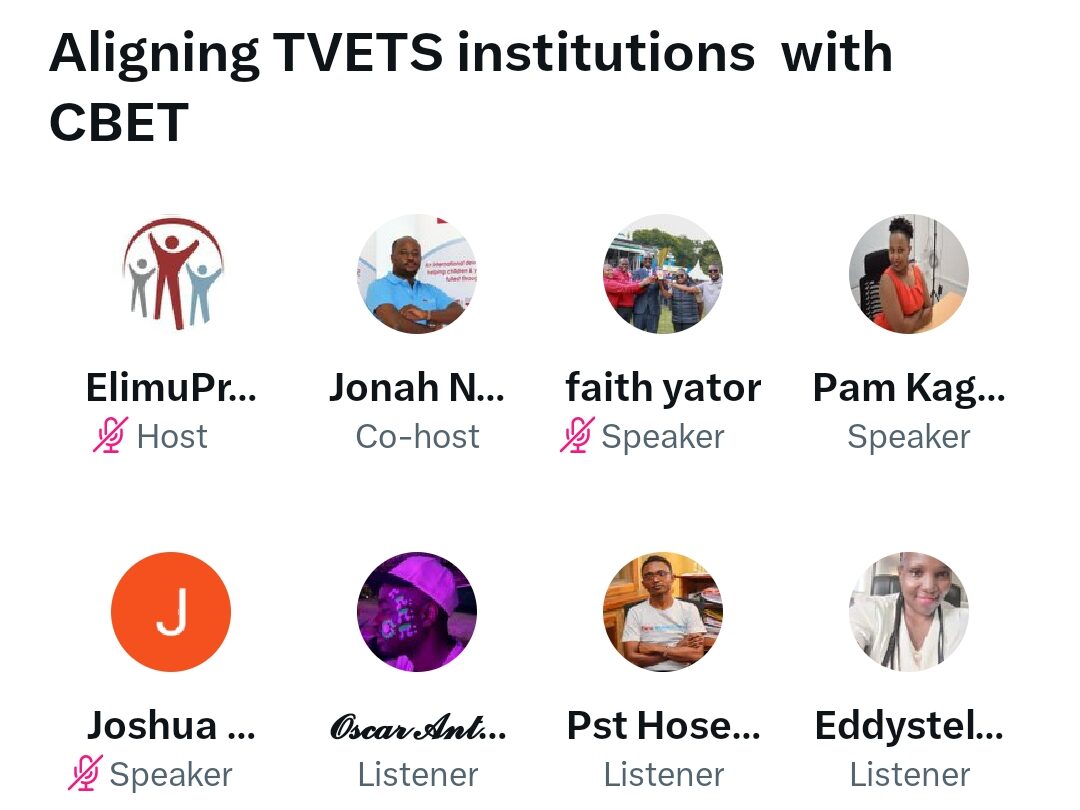
The Elimu Resource Centre on Tuesday hosted a high-level conversation on the future of Technical and Vocational Education and Training (TVET) in Kenya, focusing on how institutions can better align with Competence-Based Education and Training (CBET). The discussion, held live on X Spaces, brought together policymakers, educators, and institutional leaders to reflect on the opportunities and challenges of integrating CBET into the country’s training landscape.
Themed “How to Align the Future of TVETs with the Goals and Structures of Competency-Based Education (CBE),” the session attracted significant interest from education stakeholders keen to understand how skills training can keep pace with labour market demands.
Rethinking TVET for the Future
Panellists highlighted that, while Kenya has made strides in strengthening its TVET system, the shift to Competence-Based Education and Training remains uneven. Joshua Kanandu, Assistant Director of Training and Skills Development, Kitui County, highlighted regional disparities, pointing to gaps in infrastructure, trainer preparedness, and access to modern learning tools. He stressed the urgency of harmonising TVET delivery to ensure learners nationwide receive high-quality, skills-driven training.
Pamela Kegeni, Education Manager at Elimu, emphasised the importance of clear competency frameworks, noting that CBE is designed to produce measurable learning outcomes directly tied to industry needs.
Kageni called for the need for Sensitisation of industry and employers to establish mutual relationships with the TVETs “Competence-based training goes beyond theory. It ensures learners can actually perform tasks that the job market requires,” she said.
Faith Yator, Deputy Director at Kabarak University TVET Institute, stressed that the success of CBET depends on closer collaboration between TVET institutions and industry players. She called for stronger industry linkages to support dual learning models where learners split time between classrooms and workplaces.
“There is a need to integrate industry directly into TVET curricula,” she said, adding that apprenticeships must be recognised as a core component of training. Yator further urged institutions to adopt CBET programs that embed official training pathways while aligning policies to support structured apprenticeship.
While acknowledging that the Competence-Based Curriculum (CBC) is still new, she emphasised the importance of preparing tertiary institutions to accommodate CBC graduates. “The system should make tertiary education ready for the leaders of tomorrow,” she noted.
The conversation concluded with a set of recommendations to guide the next phase of TVET reform, including Capacity building for trainers on CBE teaching and assessment methods, Modernisation of infrastructure in training centres, Assessment reform to establish clear, competency-based evaluation criteria, and policy harmonisation to streamline CBET adoption across all counties and institutions.
The session emphasised that aligning TVET with CBE is a national development priority. As Kenya continues to invest in a skills-based economy, panellists urged policymakers, educators, and industry leaders to collaborate more closely in making competence-driven training a reality.
The Elimu Resource Centre, through such platforms, continues to champion dialogue on how to equip learners with the skills they need to thrive in a fast-changing world. The conversation was moderated by Sharon Kamau, Communications Coordinator at Elimu.
Indeed there is need to put emphasis on the dual training. It will work handy in ensuring a good transition for trainees and finding jobs available in tha market today. Thank you Dr Faith Yator.
The website design looks great—clean, user-friendly, and visually appealing! It definitely has the potential to attract more visitors. Maybe adding even more engaging content (like interactive posts, videos, or expert insights) could take it to the next level. Keep up the good work! Whith regards, EURFP
Thanks for your comment
This discussion on the future of TVET in Kenya is truly inspiring and timely. It’s encouraging to see policymakers and educators addressing the need for Competence-Based Education and Training to bridge the gap between education and industry demands. However, Joshua Kanandu’s point about regional disparities highlights a critical challenge—how can we ensure equitable access to resources and training across all counties? Pamela Kegeni’s emphasis on sensitising industry players is spot on; collaboration is key to making CBET effective. But I wonder, how can smaller institutions with limited resources implement these changes effectively? Also, recognizing apprenticeships as a core component is a great step, but what incentives can be provided to industries to actively participate in this system? Overall, this shift seems promising, but it requires sustained effort and commitment from all stakeholders. Что вы думаете о предложении по усилению роли производственной практики в учебных программах?
Wir haben libersave in unser regionales Gutscheinsystem eingebunden. Es ist toll, wie einfach man verschiedene Anbieter auf einer Plattform bündeln kann. Whith regards, WSFTD